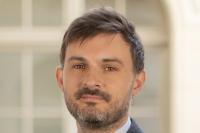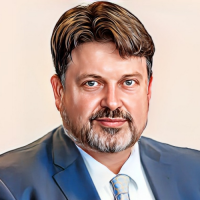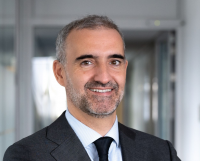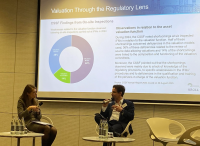
While general expectations are similar to cautious voices heard elsewhere in Europe. Luxembourg remains confident that it is well placed to weather any turmoil that 2023 may bring. The continued push to make finance sustainable and the long-term perspective of investors in private markets are among the factors that underpin this optimism.
As 2023 kicked off, Investment Officer asked representatives of Luxembourg’s financial ecosystem what the new year will bring for their business. Geopolitical uncertainty, rising interest rates, more stringent sustainability requirements, modernisation of the regulatory environment, democratisation of private equity, and pressure on costs and margins are expected to shape the next twelve months in the grand duchy’s financial system.
Camille Thommes, director general of fund industry association ALFI:
 “Implementing and complying with the continuing wave of regulation will remain a challenge for the asset management and fund industry. The implementation of the EC’s sustainable finance agenda is key for all stakeholders: CSRD, EFRAG, additional technical screening criteria for the four remaining environmental objectives etc. In addition, pressure on costs and margins in a volatile economic environment, marked by geopolitical tensions will prevail in 2023.”
“Implementing and complying with the continuing wave of regulation will remain a challenge for the asset management and fund industry. The implementation of the EC’s sustainable finance agenda is key for all stakeholders: CSRD, EFRAG, additional technical screening criteria for the four remaining environmental objectives etc. In addition, pressure on costs and margins in a volatile economic environment, marked by geopolitical tensions will prevail in 2023.”
“This being said, the fundamental strengths that characterise the attractiveness and international success of the Luxembourg fund industry stay intact. In order to retain its leading position, further efforts are required to modernise the regulatory toolkit and improve the overall tax framework.”
Nicolas Mackel, CEO of Luxembourg For Finance:
 “The macroeconomic and geopolitical turmoil that we saw define last year will continue to shape 2023. There are, however, silver linings. Most notably the fact that finance will persevere in its acceleration towards sustainability. As our need for energy independence and the existential fight against climate change converge, finance will play an increasingly significant role in achieving these goals. Finally, it is my hope that these shifts will in turn mean the financial services sector will see increased interest from young individuals deciding their future career path.”
“The macroeconomic and geopolitical turmoil that we saw define last year will continue to shape 2023. There are, however, silver linings. Most notably the fact that finance will persevere in its acceleration towards sustainability. As our need for energy independence and the existential fight against climate change converge, finance will play an increasingly significant role in achieving these goals. Finally, it is my hope that these shifts will in turn mean the financial services sector will see increased interest from young individuals deciding their future career path.”
Jerry Grbic, CEO of Luxembourg’s banking association ABBL:
 “The year 2023 will be marked by uncertainty, both for the banks and for our fellow citizens in general. The geopolitical context will continue to weigh on the economy. Inflation is here to stay. After years of zero or even negative interest rates, we are now back to a situation where banks will be able to rely on interest margins closer to the historical norm. There is no denying that this will have a positive impact on the revenues of some banks. But the banking landscape is very diverse and other banks will be affected by negative market effects or a decline in lending activity. We can therefore expect a year of transition for banks in a context where companies would need them to be at their side to finance their ecological and digital transition.”
“The year 2023 will be marked by uncertainty, both for the banks and for our fellow citizens in general. The geopolitical context will continue to weigh on the economy. Inflation is here to stay. After years of zero or even negative interest rates, we are now back to a situation where banks will be able to rely on interest margins closer to the historical norm. There is no denying that this will have a positive impact on the revenues of some banks. But the banking landscape is very diverse and other banks will be affected by negative market effects or a decline in lending activity. We can therefore expect a year of transition for banks in a context where companies would need them to be at their side to finance their ecological and digital transition.”
Stephane Pesch, CEO of Luxembourg private equity association LPEA:
 “After a 2022 vintage which could have been ‘the year of all dangers’, just after the C-19 pandemic, the private equity industry has shown its resilience, has adapted accordingly to the geopolitical, economic context and has implemented many mitigation measures in order to cope with the rise of interest rates, inflation and uncertainty. Nonetheless these adverse effects have influenced the fundraising, deal making activities and especially exits of the last months and this situation is meant to continue at least over the next quarter but the PE model - value creation - is completely intact and the investors - the LPs - have already integrated that in their future allocation plans. In 2023 we will mainly focus on ESG, sustainability and impact, the democratisation of the private markets, the Luxembourg fundraising hub, monitor the prospective regulations and closely follow the effects of the increasing costs of financing.”
“After a 2022 vintage which could have been ‘the year of all dangers’, just after the C-19 pandemic, the private equity industry has shown its resilience, has adapted accordingly to the geopolitical, economic context and has implemented many mitigation measures in order to cope with the rise of interest rates, inflation and uncertainty. Nonetheless these adverse effects have influenced the fundraising, deal making activities and especially exits of the last months and this situation is meant to continue at least over the next quarter but the PE model - value creation - is completely intact and the investors - the LPs - have already integrated that in their future allocation plans. In 2023 we will mainly focus on ESG, sustainability and impact, the democratisation of the private markets, the Luxembourg fundraising hub, monitor the prospective regulations and closely follow the effects of the increasing costs of financing.”
Nicoletta Centofanti, interim general manager, Luxembourg Sustainable Finance Initiative:
 “Every year the need to urgently transition towards sustainability is becoming more evident. In this new year, sustainable finance will continue strengthening and being a priority while facing challenges such as greenwashing, the skillset gap, measurement harmonisation, the overall market turmoil, and the fast-evolving regulatory landscape. Overcoming these will be crucial to ensure this transition and have sustainable finance become mainstream. A great deal of attention will need to be placed on strengthening the required skillset, intensifying the work on the standardisation of reporting ensuring the impact of investments is measured, and continuing to raise awareness on this matter to increase investors’ demand, avoid malpractices and refute misconceptions.”
“Every year the need to urgently transition towards sustainability is becoming more evident. In this new year, sustainable finance will continue strengthening and being a priority while facing challenges such as greenwashing, the skillset gap, measurement harmonisation, the overall market turmoil, and the fast-evolving regulatory landscape. Overcoming these will be crucial to ensure this transition and have sustainable finance become mainstream. A great deal of attention will need to be placed on strengthening the required skillset, intensifying the work on the standardisation of reporting ensuring the impact of investments is measured, and continuing to raise awareness on this matter to increase investors’ demand, avoid malpractices and refute misconceptions.”
Annick Drui, manager of the BL Sustainable Horizon fund at BLI - Banque de Luxembourg Investments:
 “Expect a continuous need for open-mindedness, change and adaptation as we are unlikely to see a slowdown in the emergence of new concepts, requirements and hurdles regarding ESG. In light of this, the importance will clearly be on not losing sight of the big picture nor practicality in all the turmoil surrounding sustainability. What is it you want to achieve? What resources do you have at your disposal? And how can you best mobilise them one step at a time to achieve the positive impact you want to see? Remember change is gradual until it is abrupt.”
“Expect a continuous need for open-mindedness, change and adaptation as we are unlikely to see a slowdown in the emergence of new concepts, requirements and hurdles regarding ESG. In light of this, the importance will clearly be on not losing sight of the big picture nor practicality in all the turmoil surrounding sustainability. What is it you want to achieve? What resources do you have at your disposal? And how can you best mobilise them one step at a time to achieve the positive impact you want to see? Remember change is gradual until it is abrupt.”
Riccardo Lamanna, country head Luxembourg at State Street:
 “The institutional services business will experience further developments in some trends that already emerged in the last couple of years: ESG, Data and Digitalization. These trends, while having specific and inherent characteristics are interlinked as data is now at the core of every business process which has to be digitalized to provide appropriate outcome and reporting like for ESG. Service providers will have to continue to invest in these areas to strengthen their competitive position and provide high quality services to their clients.”
“The institutional services business will experience further developments in some trends that already emerged in the last couple of years: ESG, Data and Digitalization. These trends, while having specific and inherent characteristics are interlinked as data is now at the core of every business process which has to be digitalized to provide appropriate outcome and reporting like for ESG. Service providers will have to continue to invest in these areas to strengthen their competitive position and provide high quality services to their clients.”
Marc Kriegsmann, head of business development asset servicing, Hauck Aufhäuser Lampe Privatbank AG:
 “Due to the high level of expertise and service quality of its market participants, Luxembourg has proven to be a fast-growing but robust and resilient fund market over the last decade. We expect 2023 to be more challenging for fund initiators in the alternative asset market – especially for real estate and real estate debt strategies. But there are plenty of strategies which are still very promising for professional investors who would like to set up their fund platforms and for fund promoters. The focus might transfer to areas like private debt, infrastructure and renewable energies for which Luxembourg will retain its excellent market position.
“Due to the high level of expertise and service quality of its market participants, Luxembourg has proven to be a fast-growing but robust and resilient fund market over the last decade. We expect 2023 to be more challenging for fund initiators in the alternative asset market – especially for real estate and real estate debt strategies. But there are plenty of strategies which are still very promising for professional investors who would like to set up their fund platforms and for fund promoters. The focus might transfer to areas like private debt, infrastructure and renewable energies for which Luxembourg will retain its excellent market position.
Xavier Zaegel, investment management leader at Deloitte:
 “In 2023, macroeconomic and geopolitical uncertainty are expected to pose new challenges for investment managers. Most firms experienced a decrease in revenue base due to capital markets in 2022, with relatively flat organic growth. As deal activity declines in 2023, post-merger integration activity will most likely emerge as the M&A theme. The investment management industry is undergoing changes that should be addressed with increased technology spending and the development of new products and services that align with changing investor preferences. Cyber risk remains one of the most pressing concerns, and we expect significant increases in spending in 2023.”
“In 2023, macroeconomic and geopolitical uncertainty are expected to pose new challenges for investment managers. Most firms experienced a decrease in revenue base due to capital markets in 2022, with relatively flat organic growth. As deal activity declines in 2023, post-merger integration activity will most likely emerge as the M&A theme. The investment management industry is undergoing changes that should be addressed with increased technology spending and the development of new products and services that align with changing investor preferences. Cyber risk remains one of the most pressing concerns, and we expect significant increases in spending in 2023.”
Alban Aubrée, assurance services partner and CFO of EY Luxembourg:
 “2023 is expected to be another volatile year with unique opportunities, in particular for alternative asset managers to deploy capital they have raised in recent years but not yet invested. This dry powder may very well become an alternative source of financing for companies whose long-term leverage capacity is impacted by the continued rise in interest rates. Relatedly, we may see a rise in distressed debt and special opportunities in the 2022 accounts being released this first quarter. Overall, strategic cost management and deeper restructuring will be high priorities for those looking to maintain their earnings objectives.”
“2023 is expected to be another volatile year with unique opportunities, in particular for alternative asset managers to deploy capital they have raised in recent years but not yet invested. This dry powder may very well become an alternative source of financing for companies whose long-term leverage capacity is impacted by the continued rise in interest rates. Relatedly, we may see a rise in distressed debt and special opportunities in the 2022 accounts being released this first quarter. Overall, strategic cost management and deeper restructuring will be high priorities for those looking to maintain their earnings objectives.”
Alek Jakima, director at GP Bullhound:
 “Although we are in an economic downturn, technology has not failed us, and it is never as good or as bad as valuations may imply. What we’re seeing is a correction and a return to looking at company fundamentals. For 2023, we are bullish on cloud and artificial intelligence, energy efficiency, enterprise software, and digital consumption to accelerate technology’s progress in building the future with revolutionary products and solutions.”
“Although we are in an economic downturn, technology has not failed us, and it is never as good or as bad as valuations may imply. What we’re seeing is a correction and a return to looking at company fundamentals. For 2023, we are bullish on cloud and artificial intelligence, energy efficiency, enterprise software, and digital consumption to accelerate technology’s progress in building the future with revolutionary products and solutions.”
Max Mailliet, managing partner at E2M:
 “The new year will be a year of great investment opportunities, especially into distressed assets, which might be on the rise. My only regret is that the reform of Luxembourg insolvency law, with new restructuring mechanisms, is still waiting to be passed, as it would be extremely helpful in the current economic climate.”
“The new year will be a year of great investment opportunities, especially into distressed assets, which might be on the rise. My only regret is that the reform of Luxembourg insolvency law, with new restructuring mechanisms, is still waiting to be passed, as it would be extremely helpful in the current economic climate.”
Stay abreast of the key developments in Luxembourg’s financial and investment ecosystem by subscribing to Investment Officer Luxembourg. Our editorial team, columnists and knowledge experts provide timely and relevant insights on topics such as supervision and regulation (EU and Luxembourg), sustainable finance and taxation, private markets and alternative investments. We also provide a daily newsletter in your mailbox around 8am on weekdays. If you are interested in sharing your expertise as an IO Knowledge Expert, contact Raymond Frenken, Editorial Manager Luxembourg via raymond.frenken(at)investmentofficer.lu.
Sign up to Investment Officer: click here to subscribe (free for industry professionals)















